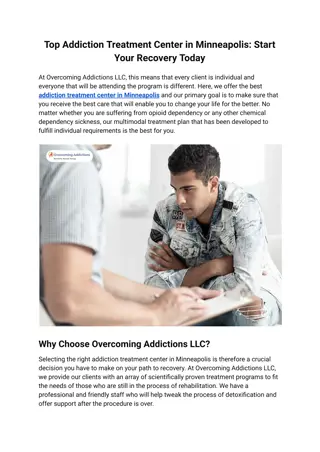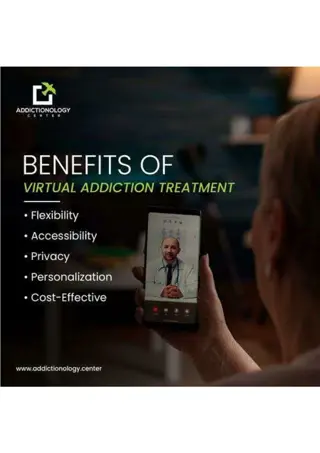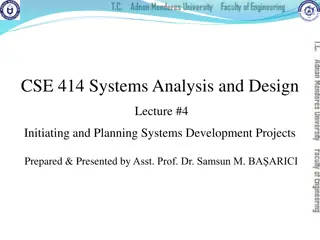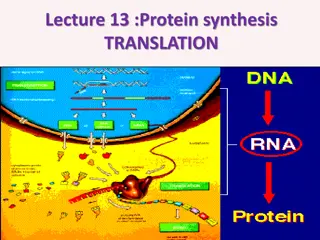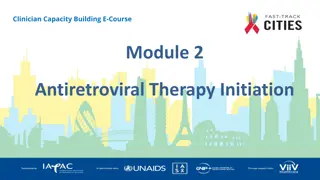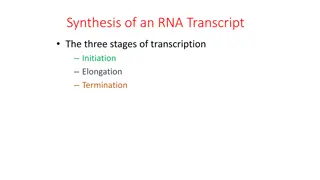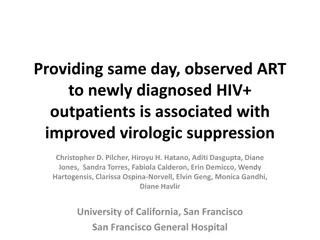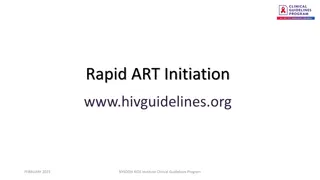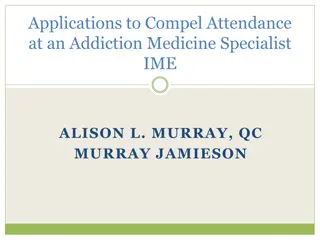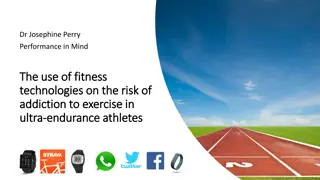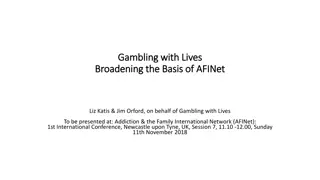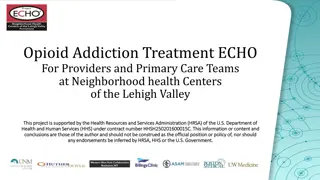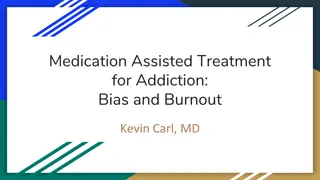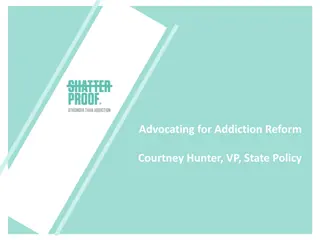Understanding Addiction: Definition, Initiation, and Impact
Addiction is a condition where an individual feels unable to control their behavior despite potential harm. It begins with pleasurable experiences that lead to compulsive engagement. Over time, increasing involvement may be needed to sustain positive feelings, making it difficult to stop. This module covers the definition of addiction, how it starts, and the implications of addictive behaviors like gaming and pornography exposure.
Download Presentation

Please find below an Image/Link to download the presentation.
The content on the website is provided AS IS for your information and personal use only. It may not be sold, licensed, or shared on other websites without obtaining consent from the author. Download presentation by click this link. If you encounter any issues during the download, it is possible that the publisher has removed the file from their server.
E N D
Presentation Transcript
Kinship Care & Addictions: Gaming and Pornography The only UK-wide charity dedicated solely to tackling child sexual abuse
Learning Recap What can you recall learning from the last module? What changes have you made as a result?
Learning Outcomes Consider what addictions are and how they begin Explore the impact of addiction to online gaming Explore the impact of increased pornography exposure Receive tips on how to support your children if you are concerned Learn where to go for advice and support if you have concerns
What is an addiction? What s the definition of addiction? How and why do addictions start? Is it easy for someone with an addiction to stop? What type of things can you be addicted to online?
Definition of Addiction When a person feels like they don t have control over their behaviour, to the point where it could be harmful to themselves (NHS) Addiction is the repeated involvement with a substance or activity, despite the substantial harm it now causes, because that involvement was (and may continue to be) pleasurable and/or valuable (American Psychiatric Association) Addiction is the repeated involvement with a substance or activity, despite the substantial harm it now causes, because that involvement was (and may continue to be) pleasurable and/or valuable (Mental Help)
How and why do addictions start? A behaviour could affect the way you feel both physically and mentally. These feelings are likely enjoyable and create a powerful urge to engage in the behaviour again If a person doesn t experience these feelings by engaging in any other behaviour, then they are more likely to go back to the behaviour that does Not engaging in the behaviour can result in negative feelings, otherwise known as a come down. If this feels really unpleasant, people often find it easier to keep doing the behaviour than to address the negative feelings in another way A behaviour usually gets out of control because you need more and more to achieve the positive feelings
Click on this educational video to learn about how addiction works. It focuses on drug use, but can be related to any form of addiction.
Persuasive design MOTIVATION ABILITY TRIGGER
Gaming It is becoming increasingly popular, particularly among females 59% of five to 15-year-olds play online games; increasing from 53% in 2018; 45% five years ago 48% of five to 15-year-old females play online games; increasing from 39% in 2018 Figures for five to 15-year-old males playing online games have remained stable at 71% This increase was driven by Eight to 11-year-olds: 66% in 2019, 58% in 2018 12 to 15-year-olds: 72% in 2019, 66% in 2018 Boys are more likely to play than girls Five to seven-year-olds: 41% males, 29% females Eight to 11-year-olds: 77% males, 55% females 12 to 15-year-olds: 87% males, 56% females
The impact of gaming What positive impact can gaming have on children and young people? What concerns do you have, or have you heard about the possible negative impact of gaming? What is your child s perspective?
35% of boys aged 12-15-years say they find it hard to control their screen time Boys are more likely to experience bullying via online gaming. One third of 8 to 15-year- olds have reported being bullied via online gaming But then also spend longer gaming online on average per week: 14 hours 36 minutes 27% of girls aged 12-15-years say they find it hard to control their screen time Girls spend an average per week of 7 hours and 30 minutes online gaming
To access games, many platforms require credit card details. Games have in-app purchases to buy tokens or passes could possibly lead to children running up unexpected credit card bills for carers Gaming can be at the expense of connection with friends in real life; therefore affecting everyday relationship skills Although gaming can also be a social activity, strengthening relationships with siblings and peers Loot boxes in games unlock special features, characters or game items. They come with a fee and you do not know what s inside until they had paid. These are criticised for promoting underage gambling. Source: Internet Matters
Mental health and behavioural concerns: Increased anger or rage, compulsivity, isolation and loneliness, depression These changes can often be more pronounced when the young person is not gaming Possible impact on physical health: Repetitive strain injury Poor posture Headaches and migraines Lack of physical activity Poor nutrition Poor quality sleep Possible impact on education and personal growth: Interference with studies Exposure to violent, graphic or sexualised content Source: Internet Matters
Computer Gaming Addiction Symptoms Impaired control over gaming preoccupation with getting back online Self-imposed isolation to facilitate uninterrupted play Continuation consequences e.g. impact on relationships, social life, studying, work life or spiralling financial costs or escalation of gaming despite negative Mental health and behavioural differences, particularly when not playing online games: anger or rage, compulsivity, isolation and loneliness, depression (Source: Internet Matters), irritability and restlessness (UK Addiction Treatment Centres) Lying about amount of time spent gaming Persistent headaches, fatigue due to lack of sleep, and diminished hygiene and/or diet
Supporting Young People What are you doing to support your young person whilst gaming? What else could you be doing?
1. Addiction is best understood as a symptom, rather than a problem (Source: Internet Matters). Simply removing gaming from a young person s life may not change how they feel Top Tips 2. Talk: why do they enjoy online gaming? What do they find difficult in life when they are not gaming? How can they overcome these difficulties without turning to gaming? 3. Reduce the amount of time spent gaming, agree set times when they can game and can t game. Ensure they have some time without gaming before going to bed. 4. Create opportunities to spend time as a family go for a bike ride, go to the park, watch a family film, cook a meal together 5. Ensure games are age appropriate, set boundaries around who they are allowed to play with (real life friends and/or online strangers), and provide guidance around how to respond to difficult situations online (e.g. exposure to inappropriate content, negative content from others)
Help & Support Priory Group: access to face-to-face, online and telephone support https://www.priorygroup.com/addiction- treatment/gaming-addiction-treatment UK Addiction Treatment Centres https://www.ukat.co.uk/gaming- addiction/ UK Rehab https://www.uk-rehab.com/behavioural- addictions/gaming/
Helpful Resources https://www.internetmatters.org/resources/online-gaming-top-tips-for-parents/ https://www.internetmatters.org/resources/online-gaming-advice/ Childnet https://www.childnet.com/resources/online-gaming-an-introduction-for-parents Childline https://www.childline.org.uk/info-advice/bullying-abuse-safety/online-mobile- safety/online-gaming/ ThinkUKnow https://www.thinkuknow.co.uk/parents/articles/gaming/ NetSafe https://www.netsafe.org.nz/gaming/
Exposure to pornography A study of 3,299 14 to 17-year-olds found that in the UK: 39% of males regularly watch online pornography 3% of females regularly watch online pornography (Stanley, et al., 2018) 95% of 16-year-olds have been exposed to sexually explicit material at least once (Mattebo, et al., 2013) Young pornography are more diverse than is typically assumed, and pornography may not be the most pressing issue for young people (Spi k and Paasonen, 2017) people s perceptions of Three to 15% of offences relating to the access of indecent images of children, are committed by young people (Hollis, & Belton, 2017)
Why children watch online pornography? to learn about sex and sexual identity for sexual arousal and pleasure curiosity for "a laugh break the rules to be disgusted to "freak out" their friends peer or relationship pressure Source: NSPCC
First they do it for laughs, like theyll do it in a group like ooh let s search up the funniest thing they can think of and then it just kind of like, people just get more and more interested over time Yeah cause like it can span from 10-year olds to even like some 9-year olds going, hey my older brother is doing this- I wanna try it, which is not good So it just depends what you are searching and what you re, what you like because you know you can probably click on one thing and think it s normal and the next minute you know it s illegal. For kids at the age of 10 and 9 they think it s cool to go watch this stuff because most of the time they don t actually care what it is, they just think it s cool to actually look at it
Pornography & The Brain Coolidge effect Reward circuitry, dopamine and opioids Relationship between dopamine and novelty Why online pornography is a unique stimulus Impact on adolescent brain Source: Your Brain on Porn
Pornography-induced erectile dysfunction Research suggests that adolescents who view lots of pornography need to progressively increase sexual stimulation to feel and remain aroused The use of pornography may change the way the brain reacts to arousal; meaning individuals are less likely to feel aroused by real life partners. This will impact on future relationships Research is in this area is fairly new and not all researchers agree; some studies found that viewing lots of pornography making increase performance and appearance anxieties, whilst some studies actually suggest that pornography helps with erectile dysfunction
Risks to children watching pornography unrealistic attitudes about sex and consent more negative attitudes about gender roles and identities in relationships ie misogyny more casual attitudes about sex and sexual relationships and an increase in risky sexual behaviour eg "rough sex" unrealistic expectations of body image and performance
Pornography Addiction Symptoms The amount of time spent watching pornography increases overtime You feel as if you need a pornography fix - and that fix gives you a high You feel guilty about the consequences of viewing pornography You spend hours on end perusing online pornography sites, even if it means neglecting responsibilities of sleep You insist that your romantic or sexual partners view pornography or acts our pornographic fantasies even though they don t want to You are unable to enjoy sex without first viewing pornography You are unable to resist pornography even though it s disrupting your life Source: Healthline
Supporting Young People What are you doing to support your young person if they use pornography? What else could you be doing?
1. Talk to your young person calmly and with caution Top Tips 2. Explore how they feel about online sexual content, to establish what pornography means to them and whether or not they value it. Are there other ways to meet their needs? 3. Reassure them that you understand why people look at pornography, but educate them about the short and long-term dangers of pornography 4. Teach them about addiction, and help them to recognise whether they feel addicted 5. Instead of viewing pornography, encourage them to visit websites exploring sex and relationships (e.g. BishUK) 6. If they are persistent in continuing to access pornography, encourage them to do it in a safe way, e.g. keeping to mainstream websites, and monitor the amount of time spent viewing 7. Risks of stumbling into child sexual abuse material on porn discuss reporting any images to IWF/CEOP
Tips for older adolescents who want to stop viewing pornography but feel like they can t Delete electronic porn and bookmarks on all your devices Discard all your hard-copy porn Have someone else install anti-porn software without giving you the password Have a plan choose another activity or two that you can turn to when that powerful urge hits When you want to view porn, remind yourself how it has affected your life Consider if there are any triggers and try to avoid them Partner up with someone else who will ask about your porn habit and hold you accountable Source: Healthline
Help & Advice Stop It Now! www.stopitnow.org.uk The Mix https://www.themix.org.uk/ UK Rehab https://www.uk-rehab.com/behavioural-addictions /pornography/the-consequences-of-a-porn-addiction/
NSPCC https://www.nspcc.org.uk/keeping-children- safe/online-safety/online-porn/ Let s Talk About It - NHS https://www.letstalkaboutit.nhs.uk/media/1188/ pornography-sex-addiction.pdf Bish UK https://www.bishuk.com/porn/
Final Reflections How are you feeling after learning all this? What will you remember from the module? Will you do anything differently because of what we ve covered?







